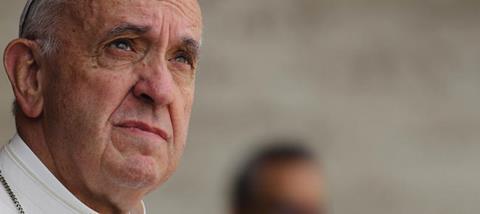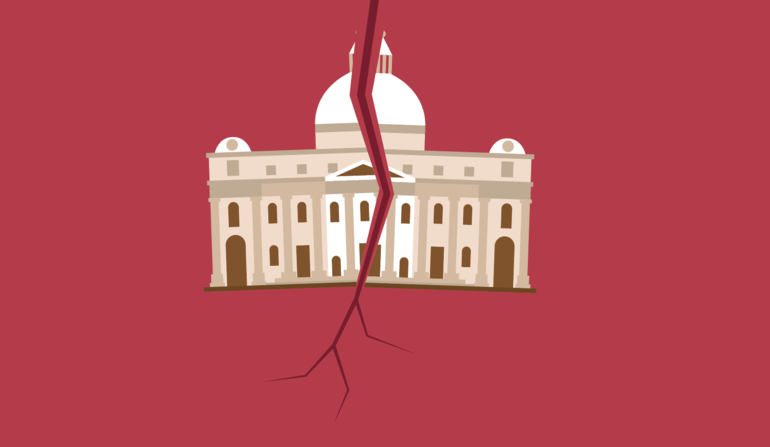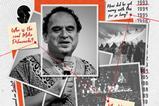The leader of the world’s 1.3 billion Catholics is facing increasing hostility within his own Church. Is he a heretic leading the flock astray or a revolutionary reorienting Catholics back to Christ’s vision in the New Testament? Megan Cornwell investigates

The election of Pope Francis five years ago signalled a step-change for the Catholic Church. The Pontiff immediately called out what he saw as the issues threatening the Church – clericalism and legalism “like the scribes and Pharisees”.
He emphasised service as central to the Christian message and placed greater emphasis on social action, mission and evangelism. In doing so, he has shown the world a different side to Catholicism: one less obsessed with Church tradition and more focused on sharing the love of Christ with the vulnerable and oppressed.
To the casual observer, it appears both Christians and non-Christians have welcomed Francis’ approach with open arms. He regularly tops the list of most influential global figures, has 18 million followers on Twitter and is loved by the mainstream media for his charisma and grand gestures. Remember when he brought a family of Syrian refugees back to the Vatican to live there? What about the photos of him embracing a severely disfigured man? Or the fact that he chose not to live in the papal palace, but in the Vatican guesthouse? The media pounced on these as examples of Francis, “the people’s Pope”.
But away from the paparazzi and the positive headlines, not everyone is pleased with the way the Argentinian is leading the world’s oldest institution. Some critics in his own Church think Francis is, at best, confusing the flock and, at worst, preaching heresy and dividing the Church. The biggest fault line to have emerged is around doctrine.
The Controversy
In November 2016, four cardinals took the unprecedented step of privately confronting the Pope about his teaching. They invoked a mechanism called dubia: a list of ‘doubts’, questioning the Pope’s teaching in his then-recently published document on family life, Amoris Laetitia (The Joy of Love).
For some Catholics, Francis’ ambiguity on divorce came close to heresy
The main debate surrounding the 256-page publication centred around the inclusion of one single footnote, which left open the possibility that clergy could administer sacraments to Catholics living in “irregular” situations. The Catholic Church has always believed that Christ’s teaching on divorce (see Mark 10:11-12) means couples who divorce and remarry, without annulling their first union and while their first spouse is still alive, are committing adultery. Therefore, according to Catholic teaching, they cannot partake in Holy Communion. But Pope Francis’ statement cracked open the door to a new way of approaching those ‘fallen from grace’: “A pastor cannot feel that it is enough simply to apply moral laws to those living in ‘irregular’ situations, as if they were stones to throw at people’s lives”, Francis wrote.
“This would bespeak the closed heart of one used to hiding behind the Church’s teachings, ‘sitting on the chair of Moses and judging at times with superiority and superficiality difficult cases and wounded families’.” Footnote 351, moreover, reminded priests that communion is “not a prize for the perfect, but a powerful medicine and nourishment for the weak”. For some Catholics, Francis’ ambiguity around this doctrinal pressure point came close to heresy.
In the weeks and months that followed the publication of Amoris Laetitia, bishops’ conferences around the world produced their own guidelines: some reaffirming the Church’s traditional teaching on divorce and remarriage, and others, lending support for the Pope’s vision of pastoral discernment and mercy. The New York Times columnist Ross Douthat puts it like this, in his book To Change the Church: Pope Francis and the Future of Catholicism (Simon & Schuster): “Multiple readings were possible and reasonable, and because the pope had declined to choose explicitly between them, all of them were embraced, by theologians and Catholic scribblers and bishops all around the Catholic world, as the true interpretation of Amoris.”
When the Pope failed to answer the dubia questions, which included clarification on the footnote and whether the Church’s prior teaching had been superseded, the cardinals took the unusual step of making their questions public. “To the extent that there were precedents for this level of open controversy, they belonged more to the early-modern and medieval periods, and to late antiquity – and they were precisely the cases that scholars and theologians long remembered as major theological crises for the church,” says Douthat. Still the Pope remained silent.
In more recent months, the press has reported on several incidents involving Francis which, for some, have further signalled a dilution of doctrine. Earlier this year, the Pope met privately with Juan Carlos Cruz, a gay man who had been sexually abused by a Catholic priest as a child in Chile. Mr Cruz told the BBC the Pope had said of his sexuality: “God made you like that and he loves you like that.” It was an echo of the “who am I to judge?” comment Francis had made about same-sex relationships at the beginning of his pontificate.
In another incident in April, during an informal papal audience with a group of children, a young boy approached the Pope to ask him whether his dad – an atheist who had nonetheless baptised his children – was in heaven. “God is the one who says who goes to heaven...Does God abandon his children?” the Pope asked him. Laying aside the issue of whether these encounters were accurately reported – and translated (the Pope’s mother tongue is Spanish) – for some, they raised questions about Francis’ theology.
In his own words
On his election in 2013:
“You know that it was the duty of the conclave to give Rome a bishop. It seems that my brother cardinals have gone to the ends of the earth to get one.”
On the Church:
“Sometimes, I speak of the Church as if it were a field hospital. It’s true: there are many, many wounded! This is the mission of the Church: to heal the wounds of the heart, to open doors, to free people…”
On the refugee crisis:
“We cannot allow the Mediterranean Sea to become a vast cemetery.”
On the priesthood:
“This I ask you: be shepherds, with the ‘odour of the sheep’, make it real, as shepherds among your flock, fishers of men.”
On sexuality:
“If a person is gay and seeks God and has good will, who am I to judge?”
On capitalism:
Unfettered capitalism is “the dung of the devil”.
On social justice:
“Today, this selfish attitude of indifference has taken on global proportions, to the extent that we can speak of a globalisation of indifference.”
On prostitution:
“This isn’t making love. This is torturing a woman. Let’s not confuse the terms.”
A new approach
When I call to speak with Fr Damian Howard, the head of the Jesuits in Britain, he is keen to explain that with Pope Francis “there’s no great change in doctrine”, but rather a change of emphasis. “There’s something about the way in which a certain kind of conservative Catholic identity has grown up in the last couple of decades, which puts clarity of doctrine right at the front of everything,” he says. “I think he [Francis] is saying to that group: ‘Listen, the gospel is there to help people, to liberate people, to transform people, to set them free, and before we worry about getting doctrine right – which we must do – we actually have to make sure we’re communicating the gospel to people, because right now, there’s a huge need for God’s mercy in the world.’”
In the case of Mr Cruz, Fr Damian explains, the Pope’s comments were no aberration from Catholic teaching, which states that while homosexual acts are sinful, being gay is not. Equally, the idea that an atheist isn’t necessarily going to hell is “no great novelty in Catholic thought”. Referring to Romans 2:12-16, he says: “Catholic theology has long accepted the theoretical possibility that God can bring about the salvation of individuals without their having explicit Christian faith.”
Moreover, context is key. This is a Jesuit Pope with a background in pastoral discernment responding in private to a man who has experienced grievous trauma, and, publicly, to a little boy weeping with grief into his cassock.
It’s a conflict that in Catholic pastoral practice is described as the “internal and external forums”. Fr Damian explains: “You might take a very clear, black and white line on an issue when you’re preaching, but then when you’re talking to someone in private and helping them, typically the Catholic Church really tries to enter into the detail of their lives and help move people forward…So there is always a tension between holding up an ideal and then helping people to live it in their lives. There is a journey we have to go on in which we learn habits of goodness, in which we learn what it is to cooperate with God’s grace. That’s one thing Pope Francis is very good at helping people think about: the journey to growth and growth in holiness.”
The Global Church
Francis is a man of firsts: the first Jesuit to be Pope, the first head of the Church from the southern hemisphere and the first Francis. His birth name is Jorge Mario Bergoglio, but he chose Francis at his inauguration after Francis of Assisi – the founder of the Franciscan Order, who eschewed wealth and power and lived the life of an itinerant preacher, in poverty and simplicity.
Catherine Pepinster, author of The Keys and the Kingdom: The British and the Papacy from John Paul II to Francis (Bloomsbury T&T Clark) agrees that the current Pope symbolises a change in tone rather than teaching. Unlike previous popes with a Eurocentric outlook, Francis is preoccupied with the issues affecting the global south: poverty, climate change, war and globalisation.
His refusal to answer the ‘dubia’ cardinals can perhaps be read as a reflection of his priorities. He doesn’t want to be drawn into the culture wars that have dominated the Church for decades and would rather focus on the bigger issues he thinks Christians should be getting agitated about.
This is partly a reflection of his Latin-American roots, Pepinster says, as well as a desire to represent a global – not purely European – Church, many of whose followers are in the developing world. “The Catholic Church is in decline in its traditional heartlands,” she says, matter-of-factly, “and he is looking at the Church in Latin America, where he comes from, he’s looking at the Church in Africa and he’s particularly looking at the Church in Asia. So in these ways he’s a different Pope.”
There’s a huge need for god’s mercy in the world
By 2040 there could be as many as 460 million African Catholics, many millions more than the number of European Catholics. Given these projections, Francis wants an ecclesial hierarchy that reflects its followers and their concerns. He has personally appointed many bishops and cardinals from the areas he refers to as the “peripheries”, which have not traditionally had representation in the Vatican. It is these leaders who will decide the next Pope in a future conclave, potentially electing another Francis figure.
When I ask Fr Damian whether the vision Francis set out at the start of his papacy – of a “poor Church for the poor” – is here to stay, he says: “Well, in a sense, it’s Christ’s vision of the Church, so yes, it has always been there and it’s here to stay.” But, he adds: “The Church is very often tempted in other directions, towards power and wealth; these things come up again and again because they’re very human temptations. It tends to be when someone like St Francis of Assisi or Pope Francis comes along and reminds us of what’s important; of course some of us don’t like that and complain about it. Some of us are rather drawn to it and excited by it.”
The Pope’s atheist friend
One issue that has puzzled Vatican insiders is why Pope Francis continues to give interviews to Eugenio Scalfari, an Italian journalist and atheist who has caused controversy by claiming the Pope told him hell did not exist.
The Pope has been caught out not once, but twice after meeting with Scalfari, with the Vatican scrambling to clarify the conversation and issue a statement of rebuttal.
While Scalfari writes up these interviews for his newspaper La Repubblica, the Vatican has been quick to point out the journalist does not record the conversations or take notes, therefore: “What is reported by the author is the result of his reconstruction… No quotation [in the article] must therefore be considered as a faithful transcription of the words of the Holy Father.”
Interestingly, Scalfari once said it was the Pope who asked for the meetings as he liked to “exchange ideas with nonbelievers”.
So does the Pope really believe (as quoted by Scalfari): “There is no hell, there is the disappearance of sinful souls"?
There’s no way of knowing for sure. But perhaps these encounters are evidence of the Pope’s passion for evangelism? What if he’s more interested in saving one soul than protecting his reputation? Some might question the wisdom of this unusual set up, but to quote the man himself: who are we to judge?
Another issue that some Catholics struggle with is the Pope’s collegial style, Pepinster says. She explains how Francis called himself “Bishop of Rome” from the earliest days after his election as a way of identifying himself with his brother bishops, rather than the Vatican elite. It’s this decentralised view of power that was at the heart of the Amoris controversy: “Pope Francis keeps sending these issues back to the bishops, saying: ‘Look at it at your level, look at it locally’. And we’re seeing that with the issue of communion…So this is his approach and I suppose people who are much more authoritarian, who think everything should come from the Pope, find that very challenging.”
But, his opposition, she says, takes the form of a small, vocal group of conservatives, which do not represent the majority of Catholics who in fact like the Pope. For Fr Damian, it’s more serious: “You’ve got some people who are saying some very extreme things and accusing the Pope of being a heretic, and I think when you start saying that sort of thing then…you are destabilising the Church in quite a big way.”
Pepinster says that the divisions within the Church are something that Francis – with his Latin title ‘Pontifex’, or ‘bridge builder’ – is responsible for addressing, but, she says: “In some ways he has been more successful in bridging the divide between the Church and the world because he resonates with people outside the Church.”
The Future of Catholicism
It’s clear to his supporters that Pope Francis is a Catholic, and that his attempts to steer Catholicism away from legalism and endless doctrinal debates have been stymied by vested interest, inertia and a desire to maintain a rules-based religion. Just as it was with the Pharisees in Jesus’ day, so it is now: self-justification is the safe option, following the Holy Spirit is more risky.
He resonates with people outside the church
Leading from behind, the 81-yearold has recalibrated in favour of a more merciful, pastoral and empowered body of Christ, who minister to the flock in the maelstrom of life, with all its complexity and beauty. His supporters argue it’s exactly the kind of Church that Jesus came to establish – not one only for the rich, clever and well-behaved, but a haven for the poor, oppressed and the sinner.
We don’t know whether Francis’ quiet revolution will endure, or if division will lead to schism. The rest of the Christian world, which perhaps looks on in a mixture of awe and disbelief, can do only what the Pope always asks for the most: “Pray for me.”





































